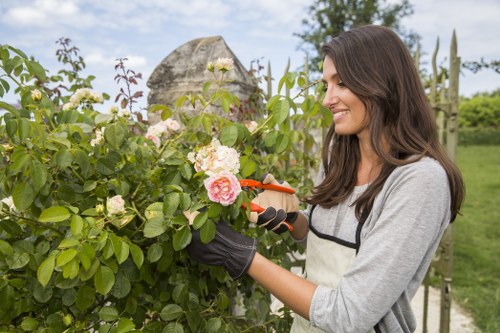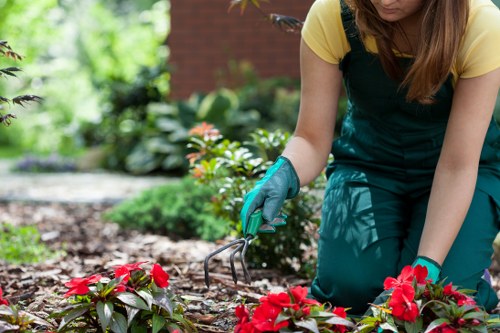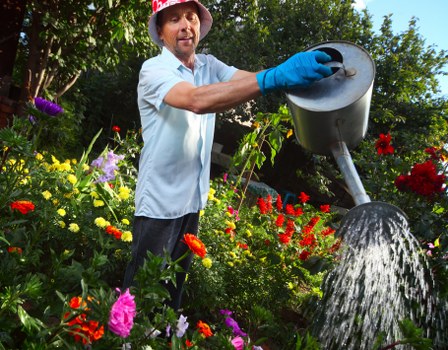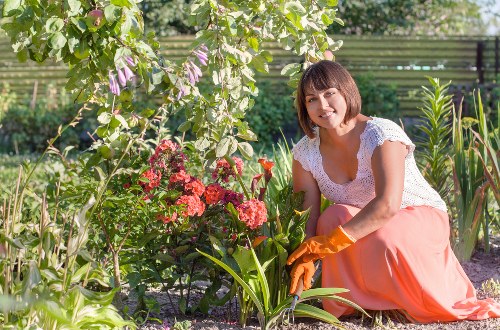Comprehensive Guide to Garden Maintenance in Edmonton
Introduction to Garden Maintenance

Maintaining a beautiful garden in Edmonton requires a blend of **dedication**, knowledge, and the right strategies tailored to the local climate. Edmonton's unique weather patterns, characterized by cold winters and warm summers, demand specific approaches to ensure your garden thrives throughout the year.
Whether you're a seasoned gardener or a novice, understanding the fundamentals of garden maintenance is crucial for creating a vibrant and sustainable outdoor space. This guide delves into the essential aspects of garden upkeep, offering practical tips and expert advice to help your garden flourish.
From soil preparation and plant selection to pest control and seasonal tasks, we've got you covered. Let's embark on a journey to transform your Edmonton garden into a picturesque haven.
Understanding Edmonton's Climate

Edmonton experiences a **continental climate**, characterized by significant temperature variations between seasons. Summers can be warm, with temperatures ranging from 15°C to 25°C, while winters are harsh, often plunging below -20°C. These extremes influence the types of plants that can thrive and the maintenance routines required.
To ensure your garden adapts to Edmonton's climate, consider the following factors:
- Frost Dates: Knowing the average last frost in spring and the first frost in fall helps plan planting schedules.
- Soil Temperature: Ensuring the soil warms up adequately before planting can promote healthy growth.
- Snow Cover: Snow acts as insulation for plants during winter, but excessive snow can cause structural damage.
By aligning your garden maintenance practices with the local climate, you can mitigate potential challenges and promote a resilient garden ecosystem.
Soil Preparation and Health

The foundation of any thriving garden is its soil. Edmonton's soil tends to be sandy or clay-heavy, depending on the region, which affects drainage and nutrient retention. Proper soil preparation is essential to create an optimal environment for plant roots.
Here are steps to enhance soil health:
- Testing Soil pH: Most plants prefer a pH between 6.0 and 7.0. Adjusting the pH can be achieved by adding lime or sulfur as needed.
- Adding Organic Matter: Incorporate compost or well-rotted manure to improve soil structure, fertility, and moisture retention.
- Mulching: Apply a layer of mulch to conserve moisture, suppress weeds, and regulate soil temperature.
Regular soil testing and amendments ensure your garden remains fertile and capable of supporting diverse plant life.
Plant Selection for Edmonton Gardens

Selecting the right plants is pivotal for garden success. In Edmonton, it's important to choose species that can withstand the local climate and soil conditions. Consider native plants as they are naturally adapted to the environment and require less maintenance.
Popular plant choices include:
- Perennials: Plants like Black-eyed Susans and Coneflowers offer long-term beauty and resilience.
- Shrubs: Boxwoods and Hydrangeas provide structure and year-round interest.
- Vegetables: Cold-tolerant varieties such as kale, carrots, and peas thrive in Edmonton's growing season.
By carefully selecting plants suited to the region, you can create a vibrant and sustainable garden that flourishes with minimal intervention.
Seasonal Garden Maintenance Tasks

Maintaining a garden in Edmonton involves different tasks throughout the year, each tailored to the specific seasonal challenges. Here's a breakdown of essential maintenance activities by season:
Spring
- Soil Preparation: Amend the soil with compost and test pH levels.
- Planting: Sow seeds and transplant seedlings once the threat of frost has passed.
- Pruning: Trim dead branches to encourage healthy growth.
Summer
- Watering: Ensure consistent moisture, especially during dry spells.
- Weeding: Regularly remove weeds to reduce competition for nutrients.
- Pest Control: Monitor for common garden pests and apply organic treatments as necessary.
Effective Watering Techniques
Water management is a critical aspect of garden maintenance. Edmonton's climate necessitates efficient watering strategies to conserve resources and promote plant health.
Consider the following techniques:
- Drip Irrigation: Delivers water directly to the plant roots, minimizing evaporation.
- Rainwater Harvesting: Collecting rainwater can reduce dependence on municipal water supplies.
- Mulching: As mentioned earlier, mulch helps retain soil moisture and reduce the frequency of watering sessions.
Implementing these methods ensures your garden receives adequate hydration without waste.
Pest and Disease Management

Protecting your garden from pests and diseases is essential for maintaining plant health. Edmonton's diverse ecosystem hosts various pests that can threaten your garden's vitality.
Here are strategies to manage pests effectively:
- Integrated Pest Management (IPM): Combines biological, cultural, and mechanical methods to control pests with minimal environmental impact.
- Natural Predators: Encourage beneficial insects like ladybugs and spiders that prey on harmful pests.
- Organic Treatments: Use neem oil, insecticidal soaps, and other eco-friendly options to treat infestations.
Regular monitoring and proactive measures can prevent pest outbreaks and maintain a healthy garden environment.
Pruning and Trimming Techniques

Pruning is vital for shaping plants, promoting growth, and removing diseased or damaged branches. Proper pruning techniques vary depending on the plant species and the desired outcome.
Follow these guidelines for effective pruning:
- Know the Plant: Understand the growth patterns and blooming seasons to avoid cutting off essential parts.
- Use Sharp Tools: Ensure clean cuts by using well-maintained shears and pruners.
- Prune at the Right Time: Typically, late winter or early spring before new growth begins is ideal for most plants.
Consistent pruning enhances plant health, encourages robust growth, and maintains the aesthetic appeal of your garden.
Mulching for Garden Health

Mulching is a practice that involves covering the soil with a layer of organic or inorganic material. This simple technique offers numerous benefits, especially in Edmonton's climate.
Advantages of mulching include:
- Moisture Retention: Helps maintain consistent soil moisture levels.
- Weed Suppression: Reduces the growth of unwanted plants.
- Temperature Regulation: Protects roots from extreme heat and cold.
Choose the right type of mulch based on your garden's needs, whether it's bark, straw, or compost, to enhance overall garden health.
Fertilizing Your Garden

Fertilization provides essential nutrients that plants need to grow and thrive. Proper fertilizing practices can significantly boost your garden's productivity and appearance.
Consider these tips for effective fertilization:
- Choose the Right Fertilizer: Select fertilizers based on the specific needs of your plants, whether it's nitrogen-rich for leafy growth or phosphorus for flowering.
- Timing: Apply fertilizers during the growing season, typically in spring and summer, to maximize nutrient uptake.
- Application Methods: Use granular fertilizers for slow release or liquid fertilizers for quick absorption.
Regular fertilization ensures that your plants receive the necessary nutrients for optimal growth and resilience.
Lawn Care in Edmonton

A well-maintained lawn complements your garden and enhances the overall aesthetic of your outdoor space. Edmonton's climate requires specific lawn care practices to keep the grass healthy and vibrant.
Essential lawn care tips include:
- Mowing: Maintain the appropriate grass height, typically around 7-8 cm, to encourage deep root growth.
- Watering: Water deeply but infrequently to promote drought tolerance and reduce shallow root systems.
- Aeration: Aerate the soil annually to improve water penetration and reduce soil compaction.
Implementing these practices will ensure your lawn remains lush and resilient throughout the seasons.
Winterizing Your Garden
Preparing Plants for Cold Weather
- Cut Back Perennials: Remove dead stems to reduce the risk of disease and pests overwintering.
- Apply Protective Mulch: Use a thick layer of mulch to insulate plant roots from freezing temperatures.
- Cover Sensitive Plants: Utilize frost blankets or burlap to protect delicate species from harsh winter conditions.
Tool Maintenance
Proper maintenance of garden tools ensures they remain in good condition and are ready for use in the spring. Clean, sharpen, and store tools in a dry place to extend their lifespan.
Choosing the Right Garden Maintenance Services

Maintaining a garden can be time-consuming and labor-intensive. Hiring professional garden maintenance services in Edmonton can alleviate these challenges, ensuring your garden remains pristine year-round.
When selecting a gardening service, consider the following factors:
- Experience: Look for companies with a proven track record and expertise in handling Edmonton's specific gardening needs.
- Services Offered: Ensure the provider offers comprehensive services, including pruning, fertilizing, pest control, and seasonal maintenance.
- Customer Reviews: Check testimonials and reviews to gauge the reliability and quality of the service.
Partnering with a reputable garden maintenance service can enhance your garden's health and beauty with minimal effort on your part.
Sustainable Gardening Practices
Eco-Friendly Techniques
Adopting sustainable gardening practices not only benefits the environment but also promotes a healthier garden ecosystem. Here are some eco-friendly techniques to consider:
- Composting: Recycle garden waste into nutrient-rich compost to improve soil fertility.
- Rainwater Harvesting: Collect and use rainwater for irrigation to conserve water resources.
- Organic Pest Control: Use natural predators and organic treatments to manage pests without harmful chemicals.
Native Plant Integration
Incorporating native plants into your garden supports local biodiversity and reduces maintenance efforts. Native species are well-adapted to Edmonton's climate, require less water, and are more resistant to local pests and diseases.
Garden Design and Layout

A well-designed garden layout enhances both functionality and visual appeal. Consider the following elements when planning your garden design:
- Plant Placement: Arrange plants based on their height, color, and blooming seasons to create depth and interest.
- Pathways and Structures: Incorporate pathways, benches, and garden structures to add functionality and aesthetic value.
- Sunlight and Shade: Position plants according to their sunlight requirements, ensuring each species receives adequate light.
A thoughtful garden design ensures a harmonious and enjoyable outdoor space that reflects your personal style.
Common Garden Problems and Solutions

Even with meticulous maintenance, gardens can encounter various issues. Being proactive and knowledgeable about common problems can help you address them effectively.
Here are some prevalent garden challenges in Edmonton and their solutions:
- Winter Damage: Protect plants with mulch and covers to prevent frostbite and breakage.
- Soil Compaction: Aerate the soil regularly to improve drainage and root growth.
- Pest Infestations: Employ natural predators and organic treatments to manage pest populations.
- Weed Overgrowth: Use mulch and manual removal to keep weeds at bay.
Addressing these issues promptly ensures your garden remains healthy and vibrant throughout the year.
Benefits of Regular Garden Maintenance

Consistent garden maintenance offers numerous advantages that extend beyond aesthetics. Here are some key benefits:
- Enhanced Plant Health: Regular care ensures plants receive the necessary nutrients and protection from diseases.
- Increased Property Value: A well-maintained garden can boost the curb appeal and value of your home.
- Personal Well-being: Gardening provides physical exercise and mental relaxation, contributing to overall well-being.
- Environmental Impact: Healthy gardens support local ecosystems, promoting biodiversity and reducing carbon footprints.
Investing time and effort into garden maintenance yields rewards that enrich both your living space and personal life.
Innovative Gardening Tools and Technologies

Advancements in gardening tools and technologies have revolutionized garden maintenance, making tasks more efficient and less labor-intensive.
Explore these modern tools:
- Smart Irrigation Systems: Automated systems that adjust watering schedules based on weather conditions.
- Robotic Lawn Mowers: Autonomous mowers that maintain your lawn with minimal supervision.
- Soil Sensors: Devices that monitor soil moisture, pH, and nutrient levels in real-time.
- Compost Turners: Simplify the composting process by efficiently mixing organic materials.
Incorporating these innovations into your gardening routine can enhance productivity and sustainability.
Community and Resources for Edmonton Gardeners
[h3>Local Gardening Clubs and WorkshopsEngaging with the local gardening community can provide valuable insights and support. Edmonton hosts various gardening clubs, workshops, and events that offer opportunities to learn and share experiences.
- Edmonton Gardeners Club: A community of enthusiasts who meet regularly to exchange tips and showcase their gardens.
- Workshops: Seasonal workshops on topics like composting, plant propagation, and sustainable gardening practices.
- Community Gardens: Shared spaces where individuals can cultivate plants collectively, fostering a sense of community and cooperation.
Online Resources and Publications
Accessing online resources can further enhance your gardening knowledge. Websites, blogs, and online forums dedicated to Edmonton gardening provide a wealth of information and a platform to ask questions.
- Edmonton Master Gardeners: Offers expert advice, publications, and resources tailored to the local climate.
- Gardening Blogs: Personal blogs from local gardeners sharing their experiences, tips, and project ideas.
- Forums: Platforms where gardeners can discuss challenges, share solutions, and exchange ideas.
Leveraging these resources can keep you informed and inspired, ensuring continuous improvement in your garden maintenance practices.
Conclusion
Garden maintenance in Edmonton is a rewarding endeavor that combines creativity, knowledge, and dedication. By understanding the local climate, selecting appropriate plants, and implementing effective maintenance practices, you can cultivate a thriving garden that stands the test of time.
Whether you choose to maintain your garden independently or enlist the help of professional services, the key is consistency and a willingness to adapt to the ever-changing environmental conditions.
Contact us today to embark on your garden maintenance journey and transform your outdoor space into a beautiful and sustainable sanctuary.